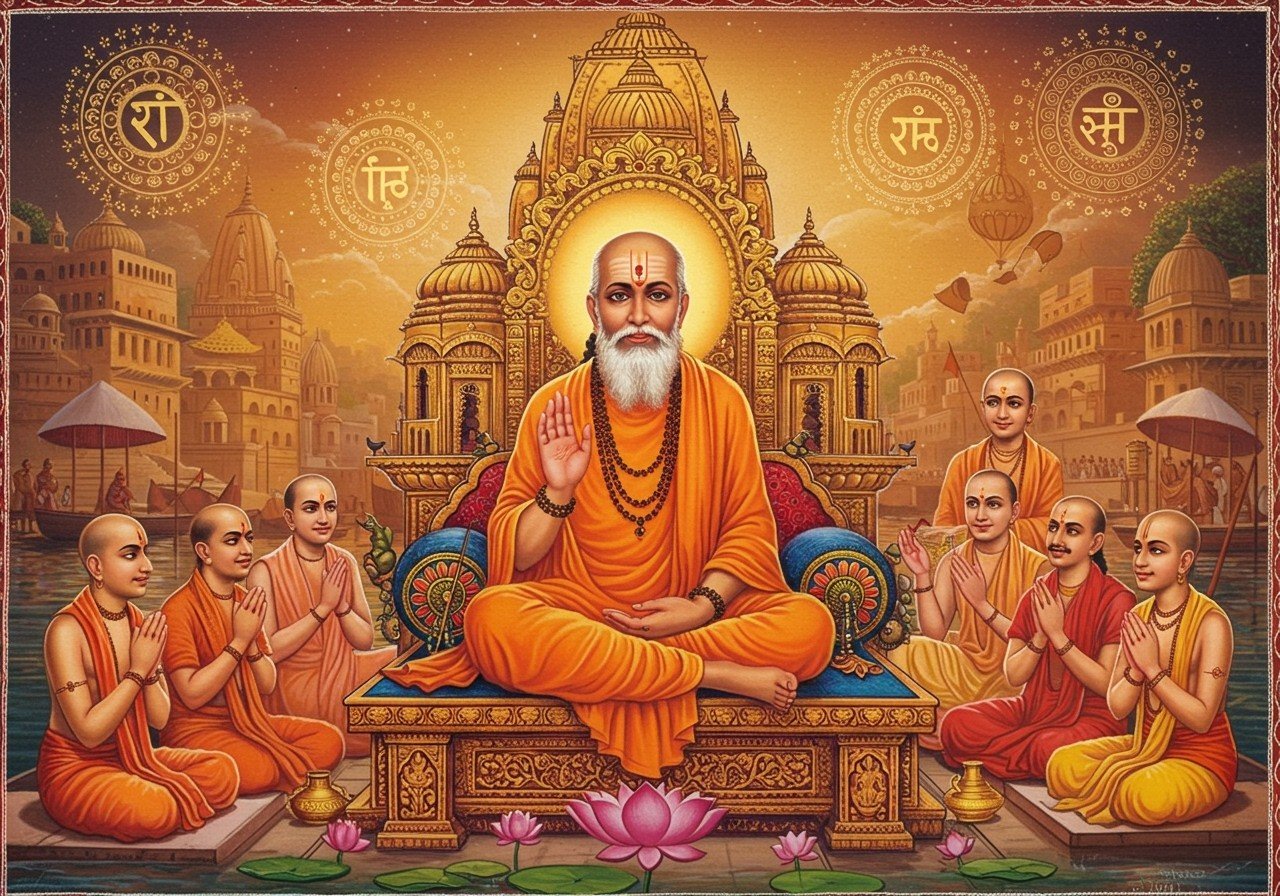
Swami Ramananda stands as a pivotal figure in the Bhakti movement, particularly prominent in North India during the 14th and 15th centuries. His teachings emphasized personal devotion over ritualistic practices. Born in medieval India, his profound influence continues to resonate in spiritual thought and practices to this day. Delving into his life and philosophies offers valuable insights into the socio-cultural context of the era and illuminates his enduring legacy in shaping religious traditions.
Who was Swami Ramananda?
Born in the 14th century in Prayag, India, Swami Ramananda emerged as a revered spiritual leader. Initially grounded in traditional Brahmanical practices, Ramananda’s spiritual path evolved towards a more inclusive approach to worship. This transformative shift led him to journey across India, gathering disciples and disseminating his teachings. His establishment of the Ramanandi sect marked a significant development in North Indian Vaishnavism, ushering in a new era of spiritual inclusivity and devotion.
Ramananda’s Profound Teachings
Ramananda’s teachings profoundly shaped the Bhakti movement, underscoring the importance of devotion over rituals and transcending caste barriers.
- Rejection of Caste Discrimination: Ramananda’s most significant contribution lies in his rejection of caste-based discrimination. By opening the doors of Bhakti to individuals from all backgrounds, he championed inclusivity and emphasized devotion as a path accessible to everyone regardless of birth, social standing, belief system, or gender. This radical stance challenged the prevailing social norms of the time and democratized spiritual access.
- Use of Vernacular Languages: Ramananda’s decision to preach in vernacular languages like Hindi, instead of Sanskrit, was a groundbreaking step towards making spiritual teachings accessible to the common people. This allowed his message of devotion and love to reach a wider audience and fostered a deeper understanding of spiritual principles. This empowered individuals who were not versed in the scholarly language of Sanskrit to engage directly with religious teachings.
- Focus on Rama: Ramananda centered his teachings on devotion to Lord Rama as the primary path to salvation. This emphasis established him as a key figure in the development of the Rama cult in North India, further popularizing the worship of Rama and shaping devotional practices. This focus provided a tangible and relatable deity for devotees to connect with and deepened the emotional aspect of worship.
- Equality and Brotherhood: Central to Ramananda’s philosophy was the principle of equality and brotherhood among all devotees. He instilled the understanding that everyone is equal in the eyes of God, fostering a sense of unity and community among his followers. This teaching transcended social hierarchies and emphasized the shared spiritual journey of all individuals.
- Influence of Disciples: Ramananda’s legacy extends through the work of his disciples, including prominent figures like Kabir and Ravidas. These disciples carried his teachings far and wide, further amplifying his message of inclusivity and ensuring its continued relevance and influence. Their contributions solidified Ramananda’s position as a transformative figure in the Bhakti movement.
Bridging North and South: Ramananda’s Role in the Bhakti Movement
Ramananda played a crucial role in bridging the Bhakti movements of North and South India. He brought together diverse spiritual traditions, creating a rich tapestry of devotion and inclusivity. His innovative use of local languages in religious practices democratized spiritual knowledge, empowering countless individuals to engage with their faith on a personal level.
Beyond spiritual teachings, Ramananda’s ideas contributed to a cultural synthesis, blending traditional Hindu beliefs with more accessible practices. His influence fostered a more personal and direct connection with the divine, leaving a lasting impact on the religious landscape of India. Explore more about the core beliefs and practices of Hinduism on poojn.in. Learn more about Hinduism.
Ramananda’s Enduring Legacy
Ramananda’s teachings resonate strongly in the contemporary world, particularly within the Ramanandi sect. His messages of social equality and spiritual inclusivity continue to inspire, and festivals and rituals celebrating his life keep his legacy alive. Beyond spiritual circles, his ideas foster interfaith dialogue and understanding in today’s diverse world. The enduring legacy of Ramananda in Indian culture can be explored further on poojn.in. Discover Ramananda’s impact on Indian culture.
His disciples’ works remain integral to India’s spiritual literature, perpetuating his vision of an inclusive spiritual community. Ramananda’s influence is deeply woven into the spiritual and social fabric of India, a testament to the power of inclusive devotion. You can also delve into the Ramayana’s influence on Hindu spirituality on poojn.in. Explore the Ramayana’s spiritual influence.
Connecting with Rama’s Teachings through Poojn.in
At Poojn.in, we offer a curated selection of products to support your spiritual journey and connection with Lord Rama’s teachings. Our offerings include:
- Ram Darbar Murti: Exquisite brass idols of Lord Rama, Sita, Lakshmana, and Hanuman for your home temple.
- Ramayana Scripture Books: Authentic versions in various languages.
- Puja Items for Ram Navami: Comprehensive sets for celebrating this important festival.
- Ram Raksha Stotra Books: Traditional prayer books with Sanskrit texts and translations.
- Pure Copper Kalash: Essential for Ram puja ceremonies.
Our products are verified for authenticity and religious compliance. We deliver across India with secure packaging. Find more puja items here.
Conclusion
Ramananda’s life and teachings offer a timeless message of unity and devotion. His revolutionary ideas transcended social barriers, making spirituality accessible to all. His legacy continues to inspire, encouraging love, equality, and personal connection with the divine. His impact is a celebration of spiritual unity, demonstrating the power of devotion to overcome boundaries and foster a shared spiritual experience. You can also explore valuable lessons on friendship, loyalty, and sacrifice from the Ramayana on poojn.in Learn more about these important values.


